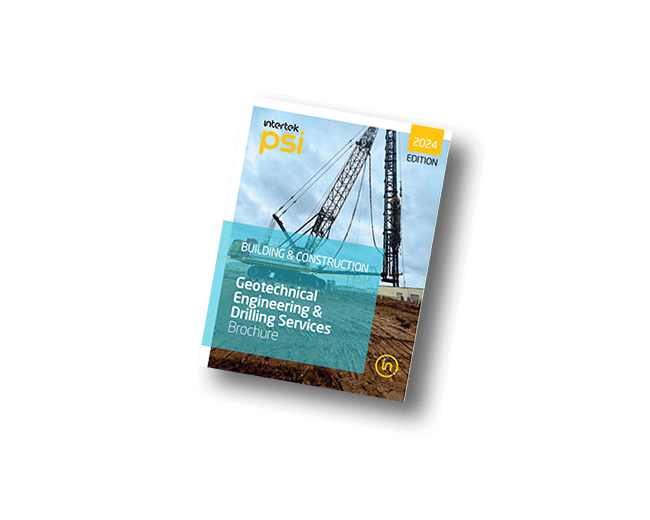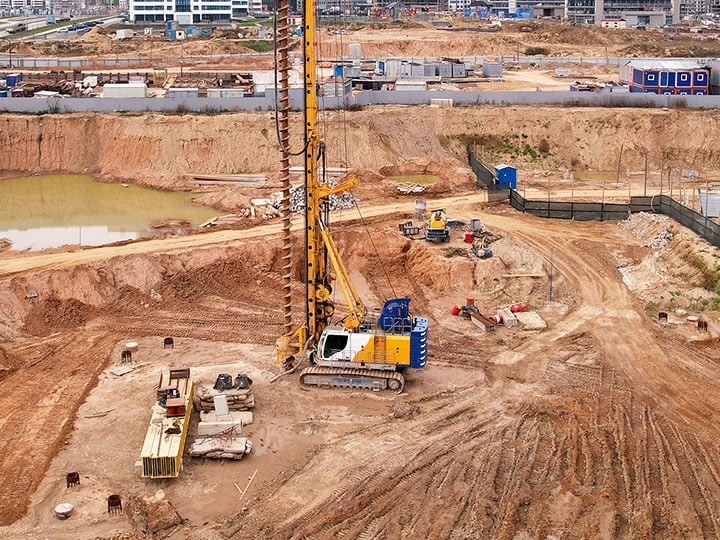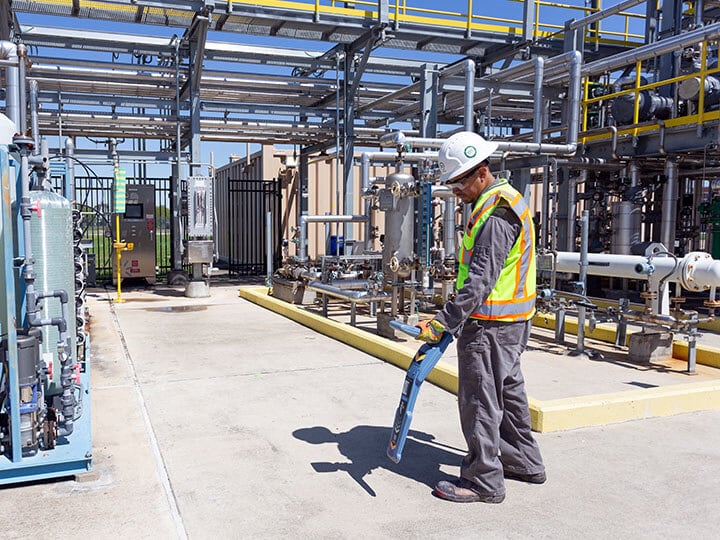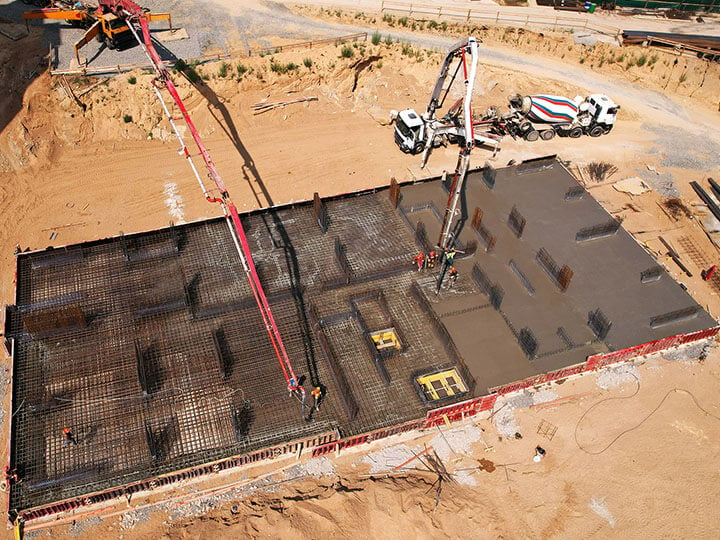Geotechnical Engineering Services to support the most fundamental aspect of every project
One of the most fundamental elements of every development project is the need to identify a site's subsurface characteristics and composition of the site's soil and rock. Geotechnical assessments are used to collect and analyze data to better understand subsurface conditions. Understanding a project's design, intended use, and how these subsurface materials interact, allows us to determine potential engineering constraints, identify safety hazards, and mitigate their impact on construction cost and schedule. These assessments ensure project success by providing this valuable information during the pre-planning stage of projects and by optimizing engineering solutions throughout construction.
Our geotechnical services include subsurface investigations, foundation design and analysis, geotechnical laboratory testing, and engineering studies and analysis. Through these services, we assist owners and contractors in identifying geohazards, and determining the safest, most resilient, and affordable earthwork and foundation solutions.
Intertek-PSI's national footprint, expertise and experience provides our clients confidence in knowing that they will receive accurate, detailed, and timely information from an engineering team familiar with the local terrain and regulations and a company with the ability to meet fast-tracked deadlines and the demand of major projects.
Geotechnical Laboratory Testing
Geotechnical conditions can vary dramatically based on a site's typography, local geology, soil composition, water content, compaction, strength and surrounding natural environment.
Intertek-PSI performs over two million individual field and laboratory material tests each year. We understand the importance of geotechnical investigations, proper field sample collection and detailed, reliable laboratory testing. The size and scope of the field exploration is appropriately determined to assess the right soil characteristics and soil profile to estimate the correct geotechnical parameters required for geotechnical designs.
Our geotechnical laboratory testing services provide crucial insights on site characteristics and the soil's response to applied loads and stresses. These data points are combined with numerical modeling and engineering judgements to inform the design, construction and maintenance of new developments and existing assets.
Our team of experienced engineers and technicians, under the guidance of our standard operating procedures (SOP), industry best management practices and the oversight of Chief Engineers, conduct a wide range of geotechnical laboratory tests that include:
- Soil Classification Tests
- Compaction Tests
- Consolidation Tests
- Shear Strength Tests
- Permeability Tests
- Shrink & Swell Tests
- Field Bearing Capacity Tests
Preliminary Surveys:
Preliminary geotechnical studies are smaller scale initial site reviews with limited exploration and analysis scopes that can provide a basic understanding of the geologic conditions of a proposed site before moving forward with site development plans. These studies typically include desk studies, subsurface investigations, and laboratory testing in order to provide the basics of site and soil characterization and a preliminary geotechnical report on expected conditions and foundation requirements.
The preliminary survey process often includes:
- Early Site Selection
- Limited Subsurface Evaluations
- Preliminary Site Characterization
- Soil & Foundation Preliminary Evaluation
- Recommendations on Final Field Exploration Scope
Geotechnical Consulting & Surveying:
Complete geotechnical studies are more comprehensive and related to a specific project. At this stage the project layout and general characteristics are know; as such, foundation recommendations of any type can be given depending on the type of soils encountered and the structural loads of the project; also general construction considerations are given.
The complete geotechnical process often includes the following items depending on type of project:
- Early Site Selection
- Subsurface Evaluations
- Field Drilling and Sampling Services
- Site Characterization
- Construction Materials Investigation
- Bearing Capacity
- Soil & Foundation Evaluation
- Shallow and Deep Foundations
- Settlement Analysis
- Retaining Walls
- Slope Stability Analysis
- Pavement Design
- Feasibility Studies
- General Construction Considerations
- Geological Studies
- Seismic Hazard and Liquefaction Analysis
- Geohazard Assessment
- Vibration Studies
- Groundwater Flow Analysis
- Geotechnical Consulting
Linear Geotechnical Surveys:
Roadway, rail, pipeline, and utility infrastructure present a unique challenge for geotechnical engineering. Spanning across varying geologic conditions and terrains, these projects often require unique earthwork solutions, structural components and foundation designs and an understanding of the interaction between not only the geologic, but the environmental conditions the finished project will encounter.
Intertek-PSI has the ability to meet all of these challenges and more with geotechnical corridor studies that can include the following:
Roadway/Transportation Studies
- Subsurface Investigations
- Field Drilling and Sampling Services
- Geotechnical Risk Assessments
- Groundwater Sampling
- Foundation, Embankment, and Retaining Wall Design
- Flood and Stormwater Management Facilities
- Geotechnical Instrumentation
- Geotechnical Monitoring
- Pavement Design
- Corridor Study/Fatal Flaw Analysis
- Borrow Studies
- AASHTO LRFD Compliant Designs
Utility and Pipeline Corridor Studies
- Subsurface Investigations
- Field Drilling and Sampling Services
- Geotechnical Risk Assessments
- Permitting And Regulatory Compliance
- Route Selection and Alignment
- National Environmental Policy Act (NEPA) Compliance
- Environmental Assessments (EA)
- Environmental Impact Statements (EIS)
- Wetland And Protected Species Analysis
- Cultural Resources Evaluation
- Groundwater Sampling
- Foundation, Embankment, And Retaining Wall Design
- Geotechnical quantities estimation
- Flood and Stormwater Management Facilities
What is Geotechnical Engineering?
Geotechnical engineering is a branch of civil engineering that focuses on understanding the physical and mechanical properties of soil and rock, and their interaction with the forces of engineered structures above ground.
Geotechnical engineers analyze the stability of natural and constructed slopes and structures and investigate soil and rock conditions through drilling, sampling, and testing. Some common applications of geotechnical engineering include the design of foundations, slopes and embankments, retaining walls and tunnels.
Why is Geotechnical Engineering Important?
The subsurface characteristics of a site can significantly impact the design and performance of engineered structures and without proper geotechnical engineering pose the risk of catastrophic consequences by structural failure. Geotechnical engineers play a key role in developing and implementing specialized design and construction solutions to mitigate potential risks and ensure the safety, stability, and durability of the built environment.
Intertek-PSI’s geotechnical engineering and drilling services bridge the gap between raw site materials and resilient finished structures, providing advanced analyses that can uncover potential engineering constraints. Download our brochure to learn more.
Intertek's Geotechnical Engineering Services:
Knowledge Center
Building Health & Wellness: An Overview of Services
Acoustical Testing & Consulting Resources
Remote Pre Inspections for NFPA 80 / 101
Protek - Safety. Everywhere. Every Day
Fire Doors 101: Your Guide to Testing and Certification - Webinar Recording
Tornado Testing & Certification Requirements - Webinar Recording
Plumbing Products Testing & Certification - Webinar Recording
The Evolving Code Evaluation Process White Paper
Proposition 65 & the Furniture Industry Webinar Recording
Why Planning for FCC Certification is Key to Success in the Door Hardware Industry White Paper

Upcoming Tradeshows & Events
Resources
- Search and Buy Building & Construction Standards
- SpecDirect
- Building Products Directory
- Project Connect (formerly myATI) – B&C Products
- Construction Hive – B&C Projects (PSIQest)
- My TestCentral








